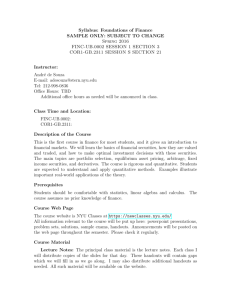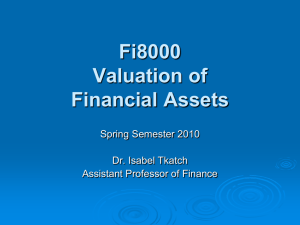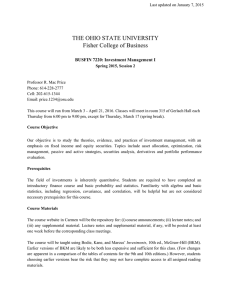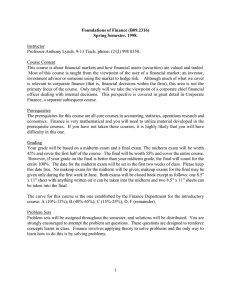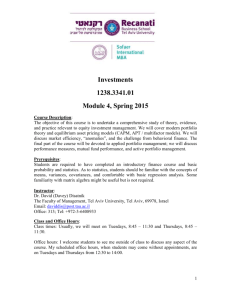B UNIVERSITY F ECONOMICS
advertisement
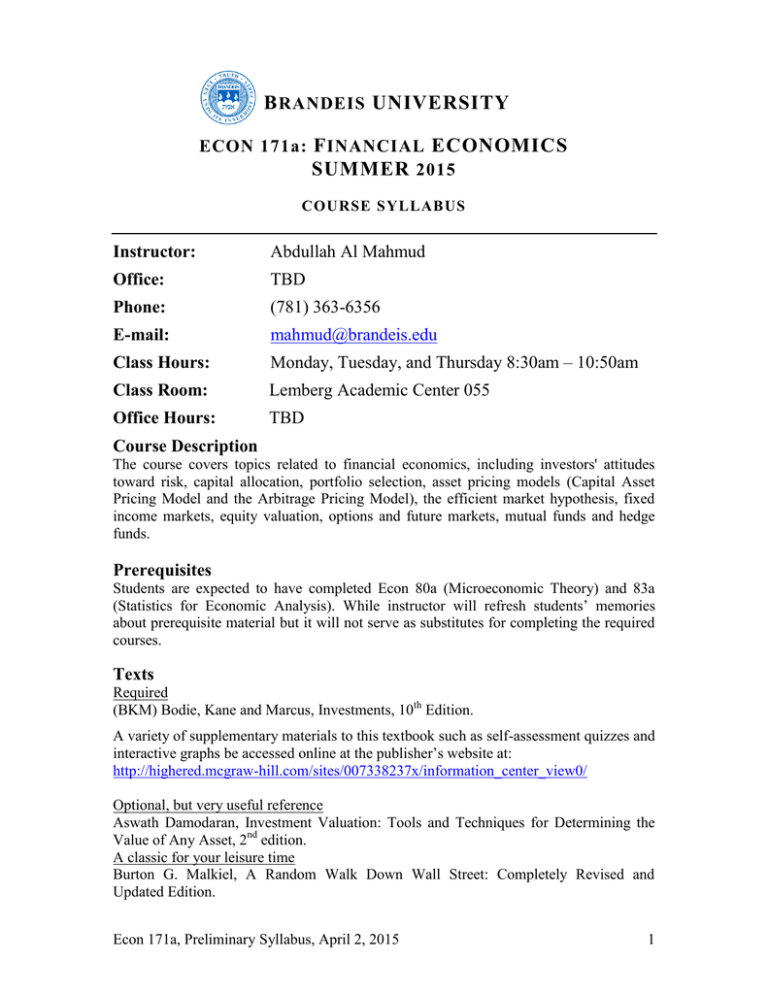
B RANDEIS UNIVERSITY ECON 171a: F INANCIAL ECONOMICS SUMMER 2015 COURSE SYLLABUS Instructor: Abdullah Al Mahmud Office: TBD Phone: (781) 363-6356 E-mail: mahmud@brandeis.edu Class Hours: Monday, Tuesday, and Thursday 8:30am – 10:50am Class Room: Lemberg Academic Center 055 Office Hours: TBD Course Description The course covers topics related to financial economics, including investors' attitudes toward risk, capital allocation, portfolio selection, asset pricing models (Capital Asset Pricing Model and the Arbitrage Pricing Model), the efficient market hypothesis, fixed income markets, equity valuation, options and future markets, mutual funds and hedge funds. Prerequisites Students are expected to have completed Econ 80a (Microeconomic Theory) and 83a (Statistics for Economic Analysis). While instructor will refresh students’ memories about prerequisite material but it will not serve as substitutes for completing the required courses. Texts Required (BKM) Bodie, Kane and Marcus, Investments, 10th Edition. A variety of supplementary materials to this textbook such as self-assessment quizzes and interactive graphs be accessed online at the publisher’s website at: http://highered.mcgraw-hill.com/sites/007338237x/information_center_view0/ Optional, but very useful reference Aswath Damodaran, Investment Valuation: Tools and Techniques for Determining the Value of Any Asset, 2nd edition. A classic for your leisure time Burton G. Malkiel, A Random Walk Down Wall Street: Completely Revised and Updated Edition. Econ 171a, Preliminary Syllabus, April 2, 2015 1 Course Materials Online This course will rely heavily on the LATTE/Moodle platform – the web site will include downloadable files with the class handouts, copies of problem sets and suggested answers. You will need your UNet username and password to log on to the system at http://latte.brandeis.edu. You should check this site, and your e-mail regularly for the course announcements. Office Hours and Communication I will usually be available for quick questions in the classroom during the several minutes before and after the class session begins. I strongly prefer that you come to my office hours, but if you cannot make it, I will arrange an alternative time to meet. I usually respond quickly to e-mail messages, so this is an excellent way to contact me if you need to set an appointment. Also, please check your e-mails frequently for course announcements. One-Minute Memos As part of your class participation, you will be asked to complete a 1-minute memo at the end of every class. The purpose of the 1-minute memo is to establish a direct line of communication from you to me so that I can assess your grasp of the main topics of the day, identify unclear points, and address other concerns. I want students to feel that they can be open and honest in these memos, so your grade is not affected by what you communicate to me on these memos. If you are not present, there will be no 1-minute memo from you, and an absence will be recorded. After each class I will return to my office to digest your memos. I will then respond to the major questions that were raised during the following lecture. In this manner you can get replies to your questions and learn from all the questions your classmates have raised as well. Course Requirements and Evaluation Your grade will be based on in-class review problems (short quizzes), problem sets, the midterm, and the final exam. Questions in the exams will be short and long answer format. You will need a calculator (NOT FINANCIAL CALCULATOR) during the exams. On the structure of the exams, 80 % of it will be pulled out directly from the previous examples from class, lecture presentations, assignments, quizzes, or suggested exercises. The other 20 % will be used to see if you can apply the course concepts to more advanced problems. All exams are closed book. You can bring one page (singleside) cheat sheet for the first midterm and one page (double-sided) cheat sheet for the final exam. Please note that in case of emergency, you may take the exams at an earlier date by prior arrangement. Please inform me at least a week in advance if you need to take the exam earlier. If you get sick on the day of the exam, I need to see the doctor’s report to verify your condition. In that case, I will work out an alternative arrangement with you. In-Class Review Problems (20%) We will have 5 short in-class review problems. These are short quizzes covering the material from the last 1 or 2 classes. Studying for them will give you a chance to review Econ 171a, Preliminary Syllabus, April 2, 2015 2 the most recent material and you will be able to check whether or not you are comfortable with it. The review problems will take about 10-15 minutes to complete at the beginning of class, so please do not be late! I will remind you about an upcoming short quiz during the previous class. Problem Sets (25%) There will be 3 problem sets. If you would like, you may work in small groups of 2-4 people to discuss the problem sets. However, you must write up answers individually. This is particularly important since the problem sets will be absolutely essential practice for the midterm and final exams. If you don't fully understand your answers you will not be prepared. I will not be able to accept any late submissions. Solutions will be posted on LATTE/Moodle after you have handed in the problem set. Midterm Exam (25%) The midterm examination will be held on July 20. You are permitted to bring one sheet of paper (8½ by 11 inches) with notes on one side, to refer to during the quiz. Otherwise, the midterm exam is closed book. Final Exam (30%) The final examination will be held during the final examination period. Currently, the final exam is scheduled for August 6. It will cover material from the entire class with a slight emphasis on the part of the course after the midterm. You are permitted to bring one sheet of paper (8½ by 11 inches) with notes on both sides, to refer to during the quiz. Otherwise, the final exam is closed book. Calculator You can use any calculator you would like when solving problems on the problem sets, including scientific, programmable, graphing, financial, or software (such as Excel). However, on the exams (i.e. quiz, midterm, and final) you will be allowed to only use scientific calculators. You will not be allowed to use programmable or financial calculators, or any other calculators capable of directly calculating bond price, annuity value, yield to maturity, or duration. In order to prepare for this, I would strongly advise everyone to purchase a scientific calculator in the near future and make sure you are able to solve problems using it. Students with Disabilities If you are a student with a documented disability on record at Brandeis University and wish to have a reasonable accommodation made for you in this class, please see me immediately. For more information go to: http://www.brandeis.edu/disability/ Academic Integrity You are expected to be familiar with and to follow the University’s policies on academic integrity (see http://www.brandeis.edu/global/current_academic_integrity.php). Consistent with Brandeis University’s honor code, your exams and assignments must be solely your own work. Instances of alleged dishonesty will be forwarded to the Office of Campus Life for possible referral to the Student Judicial System. Potential sanctions include failure in the course and suspension from the University.” Econ 171a, Preliminary Syllabus, April 2, 2015 3 Course Outline Exam Date Topic Material Quiz Problem Set 6-July Lecture 1 Review of basic financial and mathematical concepts 7-July Lecture 2 Financial Securities; Risk and Return Risk Aversion Capital Allocation (risk-free and 1 risky asset) 9-July Lecture 3 Capital Allocation (2 risky assets) Portfolio Selection (risk-free and 2 risky assets) 13-July Lecture 4 Markowitz Portfolio Selection 14-July Lecture 5 The Single Index Model 16-July Lecture 6 Capital asset pricing model (CAPM) 20-July Lecture 7 Syllabus: Lecture 1 to 6 21-July Lecture 8 Arbitrage Pricing Theory, Market Efficiency 23-July Lecture 9 Testing CAPM 27-July Lecture 10 Fixed Income Securities, Bond Pricing 28-July Lecture 11 Equity Valuation, Dividend Discount Model 30-July Lecture 12 Option Pricing 3-Aug Lecture 13 Futures, Swaps 4-Aug Lecture 14 Catch Up and Final Exam Review 6-Aug Final Exam Final Exam N.B. The topics discussed above are subject to change. Econ 171a, Preliminary Syllabus, April 2, 2015 BKM: 2 BKM: 6.1 BKM: 6.2-6.6 BKM: 7.1 - 7.2 BKM: 7.3 BKM: 7.4 BKM: 8 BKM:9 BKM: 10, 11 BKM: 11, 12, 13 BKM: 14, 15, 16 BKM: 18 BKM: 20, 21 BKM: 22, 23 Quiz #1, covers Lecture 1 Submit: Problem Set #1 Quiz #2, covers Lectures 2, 3 Submit: Problem Set #2 Quiz #3, covers Lectures 4,5 Midterm Examination Quiz #4, covers Lectures 8,9 Quiz #5, covers Lectures 9,10 Submit: Problem Set #3 Final Examination 4


